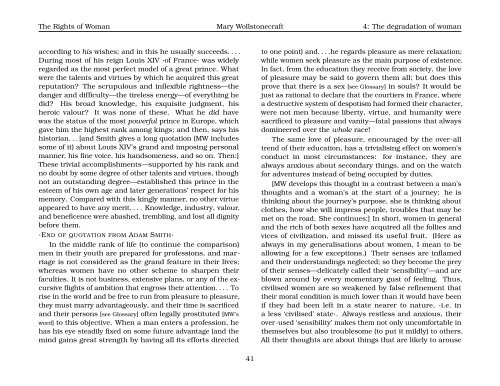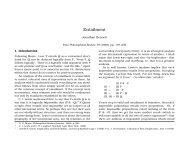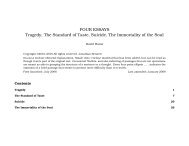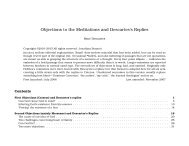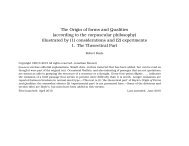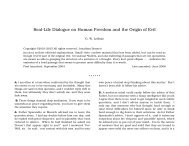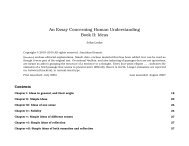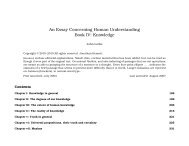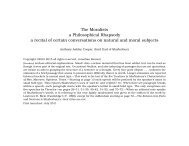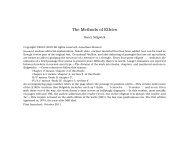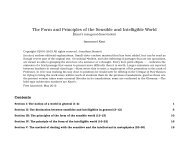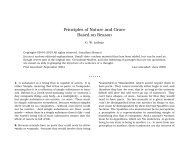A Vindication of the Rights of Woman with - Early Modern Texts
A Vindication of the Rights of Woman with - Early Modern Texts
A Vindication of the Rights of Woman with - Early Modern Texts
Create successful ePaper yourself
Turn your PDF publications into a flip-book with our unique Google optimized e-Paper software.
The <strong>Rights</strong> <strong>of</strong> <strong>Woman</strong> Mary Wollstonecraft 4: The degradation <strong>of</strong> woman<br />
according to his wishes; and in this he usually succeeds. . . .<br />
During most <strong>of</strong> his reign Louis XIV ·<strong>of</strong> France· was widely<br />
regarded as <strong>the</strong> most perfect model <strong>of</strong> a great prince. What<br />
were <strong>the</strong> talents and virtues by which he acquired this great<br />
reputation? The scrupulous and inflexible rightness—<strong>the</strong><br />
danger and difficulty—<strong>the</strong> tireless energy—<strong>of</strong> everything he<br />
did? His broad knowledge, his exquisite judgment, his<br />
heroic valour? It was none <strong>of</strong> <strong>the</strong>se. What he did have<br />
was <strong>the</strong> status <strong>of</strong> <strong>the</strong> most powerful prince in Europe, which<br />
gave him <strong>the</strong> highest rank among kings; and <strong>the</strong>n, says his<br />
historian. . . [and Smith gives a long quotation (MW includes<br />
some <strong>of</strong> it) about Louis XIV’s grand and imposing personal<br />
manner, his fine voice, his handsomeness, and so on. Then:]<br />
These trivial accomplishments—supported by his rank and<br />
no doubt by some degree <strong>of</strong> o<strong>the</strong>r talents and virtues, though<br />
not an outstanding degree—established this prince in <strong>the</strong><br />
esteem <strong>of</strong> his own age and later generations’ respect for his<br />
memory. Compared <strong>with</strong> this kingly manner, no o<strong>the</strong>r virtue<br />
appeared to have any merit. . . . Knowledge, industry, valour,<br />
and beneficence were abashed, trembling, and lost all dignity<br />
before <strong>the</strong>m.<br />
·END OF QUOTATION FROM ADAM SMITH·<br />
In <strong>the</strong> middle rank <strong>of</strong> life (to continue <strong>the</strong> comparison)<br />
men in <strong>the</strong>ir youth are prepared for pr<strong>of</strong>essions, and marriage<br />
is not considered as <strong>the</strong> grand feature in <strong>the</strong>ir lives;<br />
whereas women have no o<strong>the</strong>r scheme to sharpen <strong>the</strong>ir<br />
faculties. It is not business, extensive plans, or any <strong>of</strong> <strong>the</strong> excursive<br />
flights <strong>of</strong> ambition that engross <strong>the</strong>ir attention. . . . To<br />
rise in <strong>the</strong> world and be free to run from pleasure to pleasure,<br />
<strong>the</strong>y must marry advantageously, and <strong>the</strong>ir time is sacrificed<br />
and <strong>the</strong>ir persons [see Glossary] <strong>of</strong>ten legally prostituted [MW’s<br />
word] to this objective. When a man enters a pr<strong>of</strong>ession, he<br />
has his eye steadily fixed on some future advantage (and <strong>the</strong><br />
mind gains great strength by having all its efforts directed<br />
41<br />
to one point) and. . . .he regards pleasure as mere relaxation;<br />
while women seek pleasure as <strong>the</strong> main purpose <strong>of</strong> existence.<br />
In fact, from <strong>the</strong> education <strong>the</strong>y receive from society, <strong>the</strong> love<br />
<strong>of</strong> pleasure may be said to govern <strong>the</strong>m all; but does this<br />
prove that <strong>the</strong>re is a sex [see Glossary] in souls? It would be<br />
just as rational to declare that <strong>the</strong> courtiers in France, where<br />
a destructive system <strong>of</strong> despotism had formed <strong>the</strong>ir character,<br />
were not men because liberty, virtue, and humanity were<br />
sacrificed to pleasure and vanity—fatal passions that always<br />
domineered over <strong>the</strong> whole race!<br />
The same love <strong>of</strong> pleasure, encouraged by <strong>the</strong> over-all<br />
trend <strong>of</strong> <strong>the</strong>ir education, has a trivialising effect on women’s<br />
conduct in most circumstances: for instance, <strong>the</strong>y are<br />
always anxious about secondary things, and on <strong>the</strong> watch<br />
for adventures instead <strong>of</strong> being occupied by duties.<br />
[MW develops this thought in a contrast between a man’s<br />
thoughts and a woman’s at <strong>the</strong> start <strong>of</strong> a journey: he is<br />
thinking about <strong>the</strong> journey’s purpose, she is thinking about<br />
clo<strong>the</strong>s, how she will impress people, troubles that may be<br />
met on <strong>the</strong> road. She continues:] In short, women in general<br />
and <strong>the</strong> rich <strong>of</strong> both sexes have acquired all <strong>the</strong> follies and<br />
vices <strong>of</strong> civilization, and missed its useful fruit. (Here as<br />
always in my generalisations about women, I mean to be<br />
allowing for a few exceptions.) Their senses are inflamed<br />
and <strong>the</strong>ir understandings neglected; so <strong>the</strong>y become <strong>the</strong> prey<br />
<strong>of</strong> <strong>the</strong>ir senses—delicately called <strong>the</strong>ir ‘sensibility’—and are<br />
blown around by every momentary gust <strong>of</strong> feeling. Thus,<br />
civilised women are so weakened by false refinement that<br />
<strong>the</strong>ir moral condition is much lower than it would have been<br />
if <strong>the</strong>y had been left in a state nearer to nature, ·i.e. in<br />
a less ‘civilised’ state·. Always restless and anxious, <strong>the</strong>ir<br />
over-used ‘sensibility’ makes <strong>the</strong>m not only uncomfortable in<br />
<strong>the</strong>mselves but also troublesome (to put it mildly) to o<strong>the</strong>rs.<br />
All <strong>the</strong>ir thoughts are about things that are likely to arouse


